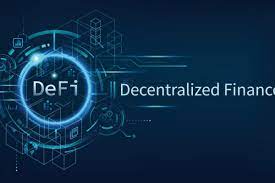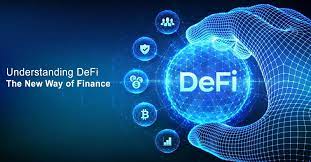In the rapidly evolving landscape of finance, a groundbreaking innovation has emerged, promising to revolutionize the way we interact with money and financial services. Decentralized Finance, or DeFi, represents a paradigm shift away from traditional banking systems towards a more inclusive, transparent, and efficient financial ecosystem. In this article, we delve into the world of DeFi, exploring its principles, advantages, and its potential to disrupt traditional banking systems.
Understanding DeFi:

At its core, DeFi refers to a decentralized financial system built on blockchain technology. Unlike traditional banking systems that rely on centralized authorities such as banks or governments to facilitate transactions and manage assets, DeFi operates through smart contracts, protocols, and decentralized applications (DApps) on a blockchain network, typically Ethereum.
Key Principles of DeFi:

- Decentralization: DeFi eliminates the need for intermediaries by allowing users to interact directly with each other through smart contracts. This decentralization fosters greater transparency, security, and autonomy in financial transactions.
- Accessibility: DeFi opens up financial services to anyone with an internet connection and a compatible device, enabling global participation without the need for traditional banking infrastructure.
- Interoperability: DeFi protocols are often interoperable, meaning they can seamlessly integrate with each other, enabling users to access a wide range of financial services and products within the ecosystem.
- Transparency: Every transaction on a blockchain is recorded immutably, providing a transparent and auditable ledger of financial activities. This transparency helps to build trust among users and reduces the risk of fraud or manipulation.
Advantages of DeFi:

- Financial Inclusion: DeFi has the potential to bank the unbanked by providing access to financial services to individuals who are underserved or excluded by traditional banking systems, particularly in developing countries.
- Lower Costs: By removing intermediaries and automating processes through smart contracts, DeFi significantly reduces transaction costs associated with traditional banking services such as remittances, lending, and trading.
- 24/7 Accessibility: Unlike traditional banks that operate within set business hours, DeFi platforms are accessible 24/7, allowing users to transact and engage with financial services at their convenience.
- Innovation and Customization: DeFi fosters innovation by enabling developers to build and deploy new financial products and services rapidly. Additionally, users have the flexibility to customize their financial strategies and investment portfolios according to their specific needs and preferences.
Disrupting Traditional Banking Systems:

DeFi poses a formidable challenge to traditional banking systems by offering a viable alternative that addresses many of the shortcomings inherent in centralized finance. As DeFi continues to gain traction, traditional banks are facing increased pressure to adapt or risk becoming obsolete.
- Competition: DeFi platforms are competing directly with traditional banks by offering similar services such as lending, borrowing, trading, and even savings accounts, but with greater efficiency, accessibility, and often at lower costs.
- Regulatory Challenges: The decentralized nature of DeFi presents regulatory challenges for governments and regulatory bodies accustomed to overseeing centralized financial institutions. However, efforts are underway to develop regulatory frameworks that balance innovation with consumer protection and financial stability.
- Erosion of Trust: Traditional banks may face erosion of trust as consumers increasingly turn to DeFi platforms that offer greater transparency, security, and control over their financial assets.
The Future of Finance:

As DeFi continues to evolve and mature, its impact on traditional banking systems will become increasingly profound. While challenges remain, such as scalability, interoperability, and regulatory compliance, the potential benefits of DeFi in democratizing finance and fostering financial inclusion are undeniable.


